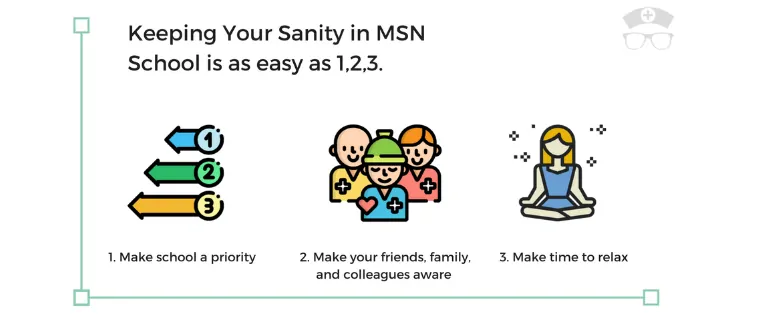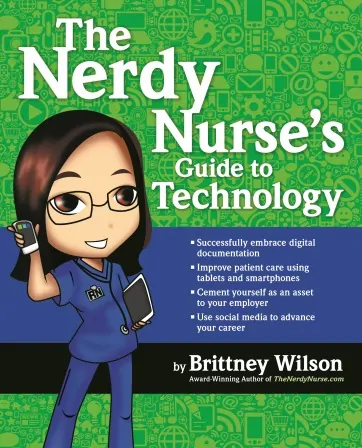In this article, we’ll dig into the different types of nursing master’s programs and share tips to help you be successful in any program you choose.
Completing a master’s in nursing program is a seemingly daunting challenge. If you’re like most nurses, you’ve got a lot going on. Carving out even a few hours a week to devote to academic endeavors may seem nearly impossible. Fortunately, with today’s technology and varying options for earning a degree, there are programs available that will fit almost any life and learning style.
In this article, we’ll dissect the different types of nursing master’s programs and share tips on how to keep your sanity while balancing work, school, and everything else. We’ve partnered with Walden University for strategies on how to maximize your success in an online master’s in nursing program.
Types of Nursing Master’s Programs
Becoming a master’s-prepared nurse isn’t a one-size-fits-all scenario. There are many different paths you can take to reach the same goal. Also, there are many types of master’s in nursing degrees that you can pursue. Some specialties and career paths in nursing (like nurse practitioner and nurse anesthetist) do require a specialized degree, licensure, or certifications. Be sure to understand your state’s requirements for specific licensure or certification obligations for your preferred career path. This article does not go into detail on that topic, but it’s something you should consider before choosing a program.
Let’s dig into the different types of programs that apply to most master’s-level nursing degrees.
Traditional or Blended-Learning Master’s in Nursing Program
Traditional programs are held in classrooms and meet at least weekly. These can usually be completed in 18–24 months. Since technology is so prolific, these programs are likely to have an online component. There are usually discussion topics online as well as most assignments are submitted electronically via an online learning platform. Many of these programs will require some form of clinical time, though some have progressed to more flexible capstone projects that may or may not require in-person clinical hours. The defining component of traditional programs is at least some of the program is held in a physical classroom. This means that your schedule has to change to accommodate this classroom time. Attendance may be graded or impact your ability to complete assignments. Program costs and length are usually fixed and based on a set number of required classroom hours.
Online Master’s in Nursing Program
Online programs typically have a similar structure to traditional programs with the primary differentiator being that all classroom learning is completed online. Because there often isn’t a focus on hours inside a classroom, and instead on core learning through completing specific assignments, many nurses spend less time completing schoolwork. A good MSN program will allow you to spend time on the work that matters most allowing you to avoid the busy work that required lecture hours can often create. So they can spend more time with their friends and family or practicing self-care.
Most programs that are identified as online programs still require some physical classroom, checkoff, or clinical time. This is standard in nurse practitioner programs but not necessarily in other nursing specialty programs. Be aware of this when searching for a program, as this is often an inflexible component that requires you to adjust your schedule to accommodate this requirement. These programs may include traditional lectures that are presented via webcast, have recorded lectures, or omit lectures all together and assess mastery through a combination of textbooks passages, writing assignments, or tests. The defining component of these programs is the emphasis on online learning.
Rest assured, Walden University offers several Master of Science in Nursing (MSN) specializations online, so you can complete them when and where it is convenient for you. They put you at the center of your nursing excellence journey.
Tips to Keep Your Sanity in Any Master’s in Nursing Program
Being successful in a master’s in nursing program is about making it work. Our tips for success are going to focus on “makes” that you must put forth a conscious effort to maintain, but the results will be worth it. Regardless of the path you choose to earn an MSN, these tips can help you and your family have a happier life with less opportunity for burnout. To put it bluntly, these tips will help you keep your sanity.
- Make it a priority. When you decide to go back to school, it’s a big commitment. You have to look at the current priorities in your life and shift things around so you have time to do the required work. If you do not put the requirements of your education near the top of your list, you are more likely to struggle to complete the program and have more stress in your life. This may mean that some items you normally complete may be put off for a short period. Let someone else be the classroom volunteer this year; you have other things that are more important right now.
- Make your friends, family, and colleagues aware. Studies show that people on a weight loss journey have more success when they make people aware of their efforts. This serves several purposes, including keeping them accountable as well as allowing people they’ve made aware to cheer them on and offer support when appropriate. Earning an MSN is no different. By making your friends and family aware of your MSN goal, they can better support you on that journey. Your brother will surely understand if you can’t make the 4-hour drive for a routine family gathering.
- Make time to relax. While you have to shift your priorities, one thing you should never neglect is time to relax. Find time in your schedule to devote to self-care. This can be 15–20 minutes a day of simple meditation, a long bath, reading an inspirational book for nurses, or maybe a weekly massage. It is extremely important that you take this time to refuel, because without it everything else in your life will suffer. You cannot take care of your family, your classwork, and your patients if you don’t first take care of yourself.
Take Your Nursing Career to the Next Level With an MSN From Walden University
One of the best ways to expand your career opportunities and grow your income is to pursue higher education. Nursing is not unique in this, but it is a profession that values education as one of the primary requirements to advance your career. If you’ve considered completing a master’s in nursing program, consider your options carefully and pick a program that aligns with your unique needs and meets the licensure requirements of the state you wish to practice in. Regardless of the program you choose, it’s essential to complete the tasks and planning needed to successfully finish the program with your sanity and relationships intact.
Walden graduates more nurses with advanced degrees than any other university.* The university offers student-centered programs focused on helping nurses achieve their goals. It’s a great choice for working professionals because its flexible online platform allows you to work around your schedule. You don’t have to shift your life around school hours—you fit in your schoolwork at times that work for you. You’ll learn through practical and applied learning with the support of advisors and student services, putting you at the center of your learning experience.
If you’re interested in taking your career to the next level, Walden is a great choice. Explore the Master of Science in Nursing program today.
*Source: National Center for Education Statistics (NCES) IPEDS database. Retrieved July 2017, using CIP codes 51.3801 (Registered Nursing/Registered Nurse); 51.3808 (Nursing Science); 51.3818 (Nursing Practice). Includes 2016 preliminary data.











